How to Implement AI Automation for Your Business: A Complete Guide
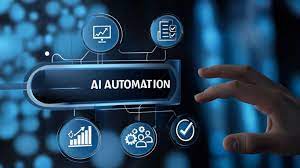
Today artificial intelligence (AI) provides numerous advantages across various fields of work. Meanwhile, instead of manually sifting through data, professionals also leverage automation techniques to streamline tasks and process larger volumes of information. With the integration of AI, automation is becoming more intelligent, unlocking even greater benefits. While AI may seem like a rival to human intelligence, the two actually complement each other. Rather than replacing human effort, AI enhances productivity by supporting human tasks.
To maximize the potential of the latest AI tools and applications, here is a complete guide that explains how they can automate your business processes. You will discover what AI automation is, how businesses are utilising it, and its potential impact on the future of work. Additionally, this guide examines practical benefits and challenges of implementing AI automation, and whether you need to implement it for your business.
What is AI Automation?
AI automation refers to the use of AI technologies, such as machine learning, natural language processing (NLP), and computer vision, to automate repetitive, rule-based, and data-intensive tasks with minimal human intervention.
Unlike traditional automation, which relies on predefined processes and instructions set by engineers, AI automation enables systems to learn from data, adapt to new environments, and make intelligent decisions autonomously. This flexibility allows AI-powered tools to perform tasks that go beyond rigid, human-designed routines.
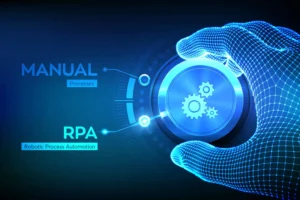
AI automation is often combined with other technologies like robotic process automation (RPA), business process management (BPM), and workflow automation to comprehensively optimize business operations. RPA automates tedious, rule-based tasks and connects disparate systems, while BPM provides a framework for analyzing and improving end-to-end processes. Workflow automation streamlines tasks by completing manual steps in sequence. Together, these tools enhance efficiency, accuracy, and productivity while reducing manual effort and human error.
AI automation can be applied through software, where AI systems analyze data, learn from it, and make decisions, or through hardware, such as RPA in the physical world. By processing large amounts of data and building AI models, these systems can drive intelligent decision-making and innovation across industries.
What are the benefits of implementing AI automation?
AI automation provides significant advantages for businesses, helping them streamline operations, reduce workloads, and enhance customer experiences. By leveraging the right tools, companies can achieve greater efficiency and productivity. Here are the top benefits of AI automation:
-
Enhanced Productivity:
AI takes over repetitive and time-consuming tasks like data entry and analysis, freeing employees to focus on higher-value, strategic work. This shift improves overall efficiency and business outcomes.
-
Improved Customer Experience:
AI automation processes vast amounts of customer data to deliver personalized interactions, timely offers, and seamless experiences. This further results in higher customer satisfaction and loyalty.
-
Better Decision-Making:
By analyzing large datasets quickly, AI provides valuable insights into trends, forecasts, and industry information. These data-driven insights enable businesses to make informed, accurate decisions.
-
Cost Savings:
Automating redundant tasks eliminates bottlenecks, reduces manual effort, and minimizes human error. This not only lowers operational costs but also helps identify inefficiencies that may be costing the business money.
-
Risk Mitigation:
AI can detect anomalies or patterns indicative of fraud and automate compliance processes, ensuring adherence to regulations and reducing risks.
-
Scalability:
AI systems can easily adapt to changing demands, handling increased workloads without compromising quality or efficiency. This flexibility allows businesses to scale operations up or down as needed.
-
Competitive Advantage:
By offering faster responses to customer needs, personalized experiences, and data-driven insights, businesses can differentiate themselves from competitors and stay ahead in the market.
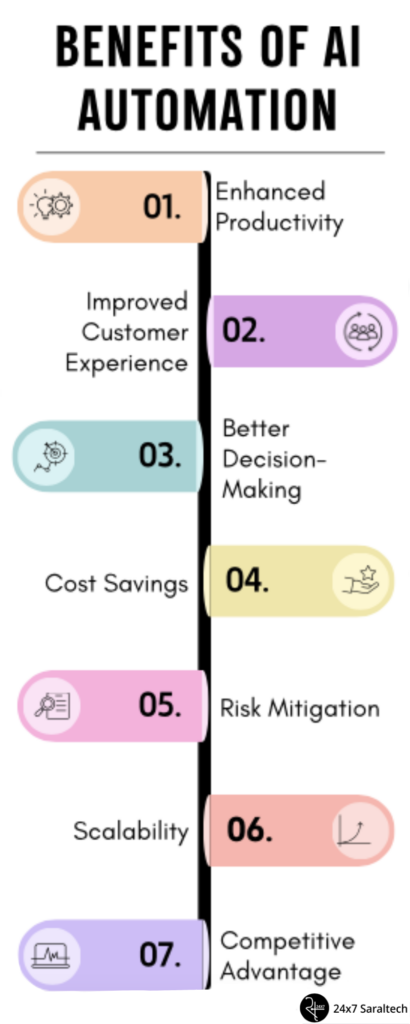
What are the challenges of implementing AI automation?
While AI automation offers numerous benefits, adopting this technology comes with its own set of challenges that organizations must address to maximize its potential while minimizing risks. Here are a few significant challenges for you to consider:
- Data Privacy and Security:AI systems often require access to sensitive business and customer data, raising concerns about privacy breaches, especially when using third-party or cloud-based platforms. Companies must comply with data privacy regulations and ensure robust security measures are in place.
- Data Quality and Availability: AI algorithms depend on high-quality, relevant data for accurate decision-making. Issues like incomplete or inconsistent data, data silos, and restricted access to necessary data can hinder AI performance.
- Ethical Considerations: AI automation raises ethical concerns around data privacy, bias, and transparency. Organizations must prioritize fairness, compliance, and trust by ensuring their algorithms are unbiased and adhere to ethical standards.
- Labor Market Impacts: Automation may displace jobs, particularly those involving repetitive tasks. To address this, companies should invest in training, reskilling, and upskilling programs to help employees adapt to new roles and technologies.
- Transparency and Explainability: Many advanced AI systems, such as deep learning models, operate as ‘black boxes’, making their decision-making processes difficult to interpret. This lack of transparency can be problematic in regulated industries where accountability is critical.
- Implementation Complexity: Integrating AI automation with existing legacy systems, workflows, and databases can be challenging. It requires specialized skills and expertise, which may be difficult to find or retain.
- Skill and Talent Gap: Successfully implementing AI automation demands professionals who understand both the technology and business processes. Organizations often face challenges in recruiting and retaining skilled talent.
How is AI automation being used across industries?
AI automation is transforming a wide range of industries by enhancing efficiency, improving decision-making, and enabling innovative solutions. Here’s how AI automation is making an impact across a few significant sectors:
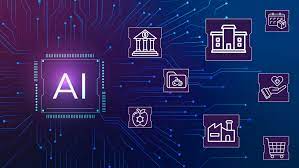
- Healthcare: AI is revolutionizing healthcare by improving disease detection, patient care, and medical research. Tools like Zebra and Google DeepMind use AI algorithms to analyze patient data and detect diseases with high accuracy. Remote patient monitoring systems, such as Biofourmis, enable real-time data collection and insights, while robotic surgical tools enhance precision and reduce errors. Additionally, AI is advancing drug discovery by modeling interactions to identify breakthrough treatments.
- Finance: In finance, AI automates processes like risk assessment and fraud detection. Lenders use AI to evaluate borrowers’ financial histories quickly, streamlining underwriting. AI also helps combat fraud by analyzing transaction data to detect unusual patterns, protecting consumers and institutions. Furthermore, AI-powered tools improve compliance and administrative tasks, such as KYC verification and anti-money laundering reporting.
- Manufacturing: AI is optimizing manufacturing through predictive maintenance, supply chain management, and operational efficiency. By analyzing historical data, AI forecasts demand, helping businesses manage inventory and reduce costs. Predictive maintenance tools monitor equipment performance, identifying inefficiencies and reducing downtime. AI also enhances product quality and streamlines distribution routes.
- Retail: Retailers leverage AI for inventory management, dynamic pricing, and customer support. AI tools like Addepto analyze sales data to optimize inventory levels, ensuring businesses meet demand without overstocking. Dynamic pricing algorithms, used by companies like Uber and Lyft, adjust prices based on real-time demand. AI also powers personalized marketing campaigns, improving customer engagement.
- Marketing and Advertising: AI automation is reshaping marketing by enabling personalized and data-driven campaigns. Generative AI tools create tailored content based on customer data, tone of voice, and product information. Platforms like ChatGPT and GPT API assist marketers in generating creative content efficiently, enhancing audience targeting and campaign effectiveness.
- Customer Service: AI-powered solutions streamline customer support by resolving issues quickly or escalating complex cases to human agents. This ensures a seamless customer experience and faster resolution times.
- Insurance: In insurance, AI has automated underwriting, claims processing, and fraud detection. Digital workers collect and analyze data from multiple sources, speeding up claims decisions and improving compliance.
Ultimately, as AI continues to evolve, it will handle larger data volumes more efficiently, accelerating progress and transforming the future of work across various fields.
How does AI automation impact the future of work?
The future of AI automation is poised to bring transformative changes, driven by ongoing advancements and increased adoption. A key concept shaping this future is ‘augmented intelligence’, which focuses on collaboration between humans and machines to unlock new possibilities. Generative AI, in particular, will play a significant role by adding creativity, adaptability, and personalization to automation.
AI automation will also have a profound impact on the future of work. While it offers businesses the ability to streamline processes and boost efficiency, it will reshape the workforce in several ways. One major effect is job elimination, as AI takes over manual and repetitive tasks. Certain roles, especially those involving routine activities, may disappear and not return as AI adoption grows.
(X post link:How will AI automation impact the future of work)
However, not all jobs will be lost, with AI automation many jobs will transform, requiring workers to develop new skills and adapt to evolving responsibilities. Professionals will need to interpret AI-generated data and make informed decisions, emphasizing the importance of upskilling and reskilling to thrive in an AI-driven world.
Additionally, AI automation has the potential to empower small businesses, which often struggle to compete with larger enterprises due to limited resources. As AI becomes more accessible, entrepreneurs will be able to achieve more with less, fostering innovation and growth. This shift could level the playing field, enabling small businesses to operate more efficiently and effectively.
Why do you need to choose AI automation for your business?
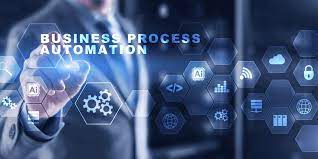
AI automation has the potential to significantly transform businesses across industries by enabling them to analyze vast amounts of data, make informed decisions, and automate tasks with minimal human intervention. By leveraging AI, companies can streamline operations, enhance productivity, and drive innovation, ultimately helping teams achieve more each day.
Whether your goal is to improve efficiency, enhance customer experiences, or optimize decision-making, AI automation offers the tools to create lasting positive changes for your business. To harness these benefits, check out the AI automation services provided by 24×7 Saraltech, designed to help you achieve your business goals effectively.
AI automation services provided by 24×7 Saraltech is transforming the way businesses manage routine tasks, from booking services to meal planning. With natural language processing and API integrations our AI agents can make your work simpler and more efficient.
To get started with AI automation today contact us at → (24×7 Saraltech)
FAQs:
AI and automation are related but distinct concepts. While both use technology to perform tasks traditionally done by humans, automation focuses on executing repetitive, rule-based tasks with consistency and reliability. AI, on the other hand, mimics human intelligence by learning from patterns and past outcomes, enabling it to make decisions and adapt over time. In essence, AI introduces intelligence to automation, allowing it to handle more complex tasks and evolve based on new data. Although they serve different purposes, AI and automation are most effective when combined, as they complement each other to enhance efficiency and decision-making capabilities.
AI automation tools are software or hardware solutions that use AI technologies like machine learning, natural language processing (NLP), and computer vision to automate tasks and decision-making. Examples include chatbots like ChatGPT for customer service, robotic process automation (RPA) tools like UiPath for repetitive tasks, predictive analytics platforms like IBM Watson for forecasting, and generative AI tools like DALL·E for content creation. By automating complex processes, AI tools enable organizations to enhance customer experiences, optimize operations, and make data-driven decisions.
An example of AI automation is the use of chatbots in customer service. These chatbots, powered by AI algorithms, can understand and respond to customer queries, automating support processes and reducing the need for human intervention. AI automation helps businesses meet rising customer expectations, such as real-time service and consistent cross-channel experiences. Tools like conversational AI, including chatbots and voice assistants, enhance customer interactions by providing instant, personalized support, improving efficiency, and reducing the workload on service teams.
